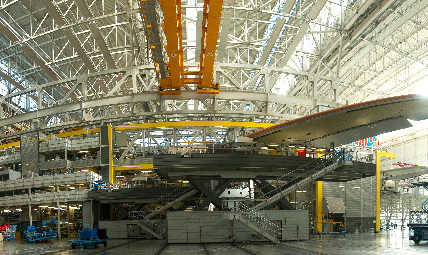Tracking technology developed by Cambridge company Ubisense can greatly improve the accuracy and reliability of manufacturing lines, while reducing assembly times by up to ten per cent, by determining the exact coordinates of an item within a given space.
Ubisense, which spun-out from the University’s Computer Laboratory in 2002 and went public in 2011, has developed a highly-sensitive real-time tracking system, which decreases losses and increases efficiency in the manufacturing sector. The company’s products are used by more than 500 companies in 50 countries worldwide, including major companies such as BMW and Airbus.
Everything we needed to build a successful company was right here, because Cambridge is such an interesting mix of industrial know-how, funding opportunities and academic expertise.
Dr Andy Ward
The assembly line which Henry Ford envisioned, where “any customer can have a car painted any colour that he wants so long as it is black,” is a world away from modern lines. Today, purchasing a car involves a head-spinning number of options, from paint colour to engine size to satnav. While this is a plus for the consumer, it has made assembly lines vastly more complicated, where each car on the line is different than the one ahead of it, meaning that tool settings must be manually changed for each car. Ubisense’s technology can improve accuracy while reducing assembly time by as much as ten per cent, automatically adjusting tool settings so that the correct settings are always used on the correct car.
The technology was developed by Andy Ward while he was a PhD student at the Computer Laboratory. Dr Ward, who is now Ubisense’s Chief Technology Officer, originally devised a system to track individuals as they moved around the Lab.
“This was in the mid-1990s, before most people had mobile phones,” he says. “At the time, it was considered totally revolutionary, because you could find out where your colleagues were without having to play phone tag. But we soon figured out that not only could you reroute phone calls, you could do lots of other interesting things too: computer systems in the building could alter the way that they worked based on who was near them and what was going on around them.”
After leaving the University, Ward co-founded Ubisense and set out to develop a more accurate version of his tracking system, which could not only determine which room an individual or piece of equipment was in, but also exactly where they were located in that room, what equipment was nearby and what that equipment was doing.
Ubisense’s system can be likened to a super-charged radio frequency identification (RFID) tag. RFID tags, such as those found in Oyster cards, send out a signal when it reaches a particular point, such as a card reader, but Ubisense’s system allows for highly precise, continuous tracking. The radio-based system consists of transmitters embedded in small tags, roughly two centimetres square, and base stations installed around a building.
As a tagged item moves through a space, the base stations will identify its precise coordinates in real time. Where RFID is useful in applications such as inventory control, the Ubisense system is ideal for manufacturing lines, where many different component parts need to come together at a certain point in time.
For example, the company has recently established a relationship with Airbus. Although Airbus builds its aeroplanes in Toulouse, the major component assemblies (MCAs) of the planes are constructed at facilities all over Europe. As Airbus does not have storage in Toulouse for huge stockpiles of aeroplane parts, all of the MCAs must arrive in Toulouse together. Airbus tags the MCAs with Ubisense technology, so that Toulouse can track their progress in factories across Europe to ensure that they all arrive in Toulouse at the same time, where they are bolted together and the finished aeroplane is flown off.
In addition to Airbus, the Ubisense technology is used by BMW in several of its car factories, saving time by ensuring that the settings on the various tools used on the line are automatically adjusted as an individual worker moves from car to car along the line. Industry estimates that the Ubisense technology can cut assembly time for each car by as much as ten per cent.
“The goal of the technology is to get the most accurate view of what’s happening, because then the computer can make the most sensible decision about what to do next,” says Dr Ward. “We’re trying to build systems which reduce the amount of human interaction which is required. By taking people out of the loop, you can make a system more error-proof. Getting the maximum visibility over what’s happening in a plant allows for maximum improvements in quality and process speed.”
In just over a decade, the company has grown from four staff to nearly 200, and in addition to its head office and research facilities in Cambridge, it has offices in Paris, Dusseldorf, Denver, Singapore and Seoul.
The company maintains links with the Computer Laboratory, where it originated, collaborating on various research projects. Its technology is manufactured in the UK, at a facility in Bedford.
Ward says it was the characteristics of the Cambridge Cluster which enabled the company to get off the ground in the first place. “Everything we needed to build a successful company was right here, because Cambridge is such an interesting mix of industrial know-how, funding opportunities and academic expertise.”
Photo credit: Airbus A380 Final Assembly Line, by Pierre J via flickr
Tags: andy ward, computer laboratory, RFID, tracking, ubisense











